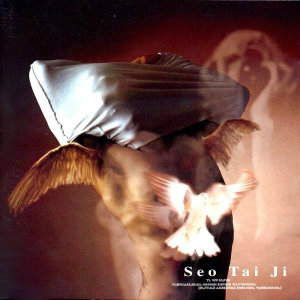
X Japan is a Japanese rock band from Chiba, formed in 1982 by drummer Yoshiki and lead vocalist Toshi. Starting as a predominantly power/speed metal band with heavy symphonic elements, they later gravitated towards a progressive sound with an emphasis on ballads. Besides being one of the first Japanese acts to achieve mainstream success while on an independent label, the group is widely credited as one of the pioneers of visual kei, a movement among Japanese musicians comparable to Western glam.
Tetsuya Iwanaga is a Japanese voice actor. He is affiliated with maxmix.

Hideto Matsumoto, better known by his stage name hide, was a Japanese musician, singer-songwriter and record producer. He was the lead guitarist of the rock band X Japan from 1987 onward, and a solo artist from 1993 onward. He also formed the United States-based rock supergroup Zilch in 1996.

Jeong Hyeon-Cheol, better known as Seo Taiji or Seo Tae-Ji (서태지), is a South Korean singer, musician, songwriter and record producer. After dropping out of high school to pursue a music career, he has risen to become one of the most prominent and influential cultural icons in South Korea, with many referring to him as "the President of Culture".
Kiyoyuki Yanada is a Japanese voice actor.

Taiji Sawada, also known mononymously as Taiji, was a Japanese musician and songwriter. He is best known as the former bassist of the rock band X. X rose to prominence in the late 1980s and early 1990s, credited as founders of the Japanese visual kei movement. After leaving X in January 1992, Taiji went on to work with many other bands, including Loudness and D.T.R.

Monthly Magazine Z was a Japanese seinen mixed-media magazine published by Kodansha, aimed at teenage males and above, but particularly at hardcore anime and manga fans, featuring articles as well as manga tied into popular franchises. Original manga were also featured in the magazine.

Yoshihiro Takahashi is a Japanese manga artist. He writes under a pen name in which his first name Yoshihiro is spelled out in hiragana (よしひろ).

Magic Bus is a Japanese animation studio headquartered in Nishi-Tokyo, Tokyo, Japan. The company was founded in April 1972 by producer and director Satoshi Dezaki, and the studio's first work was Shin Kyojin no Hoshi in 1977. In 1983, with Dezaki directing, Magic Bus collaborated in the animation production of Captain. Magic Bus has since become largely an animation subcontractor for other animation studios.

Akira Kushida, is a Japanese vocalist who is well known for his work in the soundtracks for anime and tokusatsu productions, most notably Taiyou Sentai Sun Vulcan, Kinnikuman, and Uchuu Keiji Gavan. His nickname from his fans is Kussy. His real given name is Akira.
Shinji Wada was a Japanese manga artist in Kure, Hiroshima Prefecture, Japan, and best known for the creation of the Sukeban Deka franchise.

Maps (マップス) is a Japanese manga series written and illustrated by Hasegawa Yuichi. It was serialized in the Gakken magazine Monthly Comic Nora from 1985 to 1994. The series was adapted into two anime original video animations (OVAs): the 1987 original, fully titled Maps: Densetsu no Samayoeru Seijintachi in Japan, and the 1994 remake, simply titled Maps.
Akiko Suzuki, formally known by the stage name Yukiji (ゆきじ), is a Japanese voice actress affiliated with 81 Produce.
"Dindi" is a song composed by Antônio Carlos Jobim, with lyrics by Aloysio de Oliveira. It is a world-famous bossa nova and jazz standard song. Jobim wrote this piece especially for the Brazilian singer Sylvia Telles. "Dindi" is a reference to a farm named "Dirindi", in Brazil, a place that Jobim and his friend/collaborator Vinicius de Moraes used to visit. In December 1966, just a short while after Telles had recorded this piece with the guitarist Rosinha de Valença, she was killed in a road accident in Rio de Janeiro.
This is Japanimetal Marathon is an internationally released album by Japanese novelty heavy metal band Animetal. The album consists mainly of Animetal Marathon mixed with select tracks from the band's singles along with those of Animetal Lady. Each track is labeled by the anime/tokusatsu title they come from, not by their original song title.

Como ser Feliz ganhando Pouco is the third album from Brazilian blues/rock band O Bando do Velho Jack, and was released in 2002.

Seo Tai Ji is the debut studio album by Korean musician Seo Taiji, released in 1998. Although it is the first solo album by Seo, some refer to it as his fifth following the four albums released by Seo Taiji and Boys. The musician created the album entirely by himself, including playing every instrument and producing it. The album was released in 1998 while Seo lived in the United States and, with no promotion, it sold over 1.3 million units, making it one of the best-selling albums in South Korea.

Banana da Terra is a 1939 Brazilian musical film directed by Ruy Costa and written by Braguinha and Mário Lago. The film stars Carmen Miranda, Dircinha Batista and Aloysio de Oliveira. It was Miranda's last film in Brazil, before she moved to Hollywood.
Sachi Kokuryu is a Japanese actress and voice actress from Saitama Prefecture. She is affiliated with Himawari Theatre Group.












